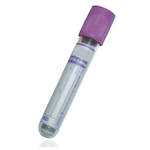Suitable Specimen Types
- Plain Spot Urine
- EDTA Whole Blood
Specimen Transport
Normal transport to laboratory.Sample Processing in Laboratory
DO NOT SPIN. Keep sample refrigerated, send via first class post to referral laboratory to arrive within 5 days of collection.Sample Stability
Store refrigerated until sent. Should be received by referral laboratory within 5 days of collection.MODY genetic testing
General Information
Telepath codes for MODY Genetic Testing:
|
Telepath code |
Test |
|
GCK |
GCK sequencing |
|
HNF |
HNF1A and HNF4A sequencing |
|
MIDD |
m.3243A>G test for MIDD |
|
NGS |
Next generation sequencing 16 gene test for monogenic diabetes including all MODY genes, MIDD and partial lipodystrophy |
|
NGSNEG |
Next generation sequencing 16 gene test only if GCK or HNF1A/4A testing by Exeter lab is negative |
|
MODYKM |
Known mutation test (for families where mutation has already been identified) |
|
MODYNN |
MODY genetic testing in neonates (NB: this will only be requested if the patient was diagnosed with diabetes under 9 months of age regardless of their current age. Testing is funded via the Wellcome Trust) |
(Information taken from diabetes.org.uk)
Maturity-onset Diabetes of the Young (MODY), or monogenic diabetes, is a rare form of diabetes which is different from both Type 1 and Type 2 diabetes, and runs strongly in families. MODY is caused by an autosomal dominant mutation in a single gene. Therefore, if a parent has this gene mutation, any child they have, has a 50 per cent chance of inheriting it from them.
If a child does inherit the mutation they will generally go on to develop MODY before they’re 25, whatever their weight, lifestyle, ethnic group etc.
The key features of MODY are:
- Being diagnosed with diabetes under the age of 25.
- Having a parent with diabetes, with diabetes in two or more generations.
- Not necessarily needing insulin.
MODY is very rare compared with Type 1 and Type 2 diabetes – experts estimate that only 1–2% of people with diabetes (20-40,000 people) in the UK have it. But because MODY is so rare, doctors may not be aware of it, so it’s estimated that about 90 per cent of people with it are mistakenly diagnosed with Type 1 or Type 2 diabetes at first.
The most common types of MODY are:
- HNF1-alpha. This gene causes about 70 per cent of cases of MODY. It causes diabetes by lowering the amount of insulin made by the pancreas. Diabetes usually develops in adolescence or early twenties, and people with HNF1-alpha MODY generally don’t need to take insulin: they can be treated with small doses of a group of tablets called sulphonylureas (often used in Type 2 diabetes).
- HNF4-alpha. This isn’t as common as the other forms of MODY. People who have inherited a change in this gene are likely to have had a birth weight of 9lb or more (around 4kg). They may also have had a low blood sugar at, or soon after, birth which might have needed treatment. People with HNF4-alpha are generally treated with a sulphonylurea tablet but may progress on to needing insulin.
- HNF1-beta. People with this type of MODY can have a variety of problems including renal cysts (cysts of the kidneys), uterine abnormalities and gout, as well as diabetes. Often the renal cysts can be detected in the womb before a baby is born. The diabetes tends to develop later and insulin treatment is usually necessary, as well as following a healthy balanced diet and getting regular physical activity. HNF4-beta MODY also carries a risk of complications of diabetes.
- Glucokinase (GCK). This gene helps the body to recognise how high the blood glucose level is in the body. When this gene isn’t working properly the body allows the level of blood glucose to be higher than it should be. Blood glucose levels in people with glucokinase MODY are typically only slightly higher than normal, generally between 5.5-8mmol/l. You don’t generally have symptoms of this type of MODY and so it’s often picked up through routine testing (eg during pregnancy). You don’t need any treatment for glucokinase MODY.
All types of MODY apart from glucokinase carry a risk of the long-term complications of diabetes so you should follow a healthy balanced diet and keep physically active as this helps to maintain good blood glucose and cholesterol levels which in turn reduce the risk of complications.
It’s important to know if you’ve got MODY, for the following reasons:
- To make sure you get the right treatment and advice for your type of diabetes (eg stopping insulin).
- As there is a 50 per cent chance of a parent passing on MODY to their child, you can consider and discuss the risk to any children you have/plan to have.
- Genetic testing can be offered to other family members.
Testing for MODY involves:
- Having blood taken for pancreatic antibodies and blood or urine tested for C-peptide (your doctor/hospital can do this).
- Having blood taken for genetic testing:
Patient Preparation
EDTA whole blood or genomic DNA.
Urine samples for m.3243A>G testing. Urine should be 20ml of the very first pass of the first visit to the toilet of day (i.e. early morning sample) taken into a sterile universal container.
Notes
Please note, reports are sent directly to clinicians.
Reference Range
Interpretation of results will be provided by the referral laboratory.
